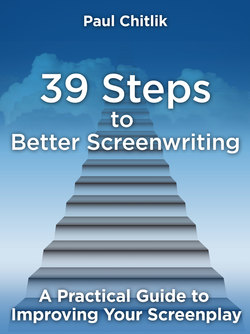Читать книгу 39 Steps to Better Screenwriting - Paul Chitlik - Страница 8
На сайте Литреса книга снята с продажи.
ОглавлениеStep 2
Eight Things to Remember When Writing Science Fiction
I’ve always written in whatever genre I wanted to write in at the time, so my career has caromed from reality TV to sitcoms to science fiction to kids’ movies to one-hour dramas and back again. With my experience in so many fields, people often ask me what the difference is between them. The answer is … very little. They all depend on human emotion and conflict, flaws and goals, victory and defeat. Even science fiction.
So, could I just leave it at that? That science fiction is the same as comedy or drama or commercials for Alpha Bits? (Yes, I was the one who wrote the Swirlpool ad. Sorry.) No. There are some things to keep in mind when you write science fiction (or sci-fi or speculative fiction or whatever you’d like to call it). There are no rules, but there are guidelines. Here are some of the things we used to tell prospective writers for The New Twilight Zone mixed in with a few additions of my own.
1 There has to be a reason your central character is involved in this. So you have to answer the same questions that you ask of any protagonist: Why him? Why now? Your hero has an issue. He’s going to have to deal with that one day. Why today? So, know your hero’s issue and know why it’s reached a crisis. Obviously, this goes for any type of screenwriting, too.
2 Get to the magic as soon as possible. In TZ, that meant the weirdness, the special condition, the situation that set this episode off from others. In a sci-fi film, it could be the setting, the time, the technology, whatever is the speculative part of the story.
3 Have the special rules of your world clearly defined in your mind and don’t violate them. You can have any rules you want to — people can become invisible, they can live on pills, they can fly at light speed — so long as you’re consistent. If there’s no gravity, things can’t fall. You can’t suddenly have something fall for no reason. But if something must fall, make it clear why the rules have been broken. Nothing is worse for a sci-fi devotee than an inconsistency in the rules you have set up.
4 Don’t let the technology overcome the story. Yes, tech stuff in sci-fi movies is great, but we go to see the human story. Of course, the light sabers are fun, but the original Star Wars is about a boy becoming a man, finding his inner strength and his place in the world. That’s why we went to see it so many times, though we did have fun with those light sabers.
5 Have an emotional relationship feature prominently. Humanize the science. Make it personal. Make sure your protagonist becomes involved in an important emotional relationship. It doesn’t have to be a romance; it could be father and son, brother and sister, two buddies. Whatever. It will make your script deeper and help bring in a wider audience.
6 Write your protagonist with flaws, especially one that he has to overcome in order to mend or cement the central emotional relationship and prevail in the final challenge.
7 Don’t forget humor. Some of the best moments of science fiction films are the funny ones. Even some of the best science fiction films are comedies. (Galaxy Quest is one of my favorites.)
8 Have conflict in every scene. Yes, you already know this. Yes, it applies to science fiction. Especially to technology. When it fails, it’s always a tense moment. Make it fail. Make your hero work hard to reach his/her goal.
Of course, most of this applies to any kind of screenwriting. That’s the idea. Good science fiction has to be good on the science and good on the fiction. Do that, and I’ll be lining up to get a ticket to see your film.
